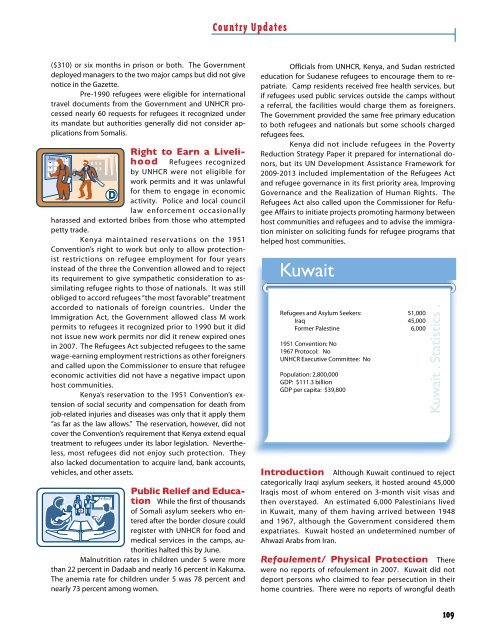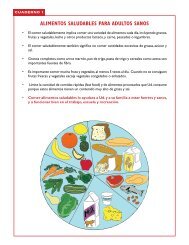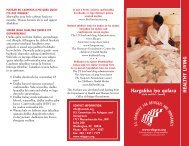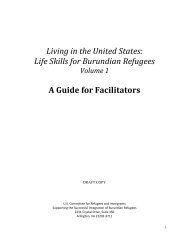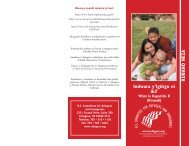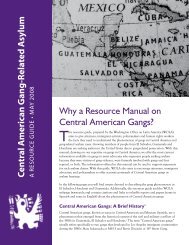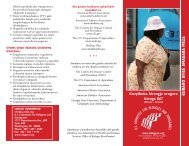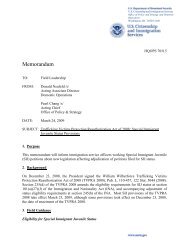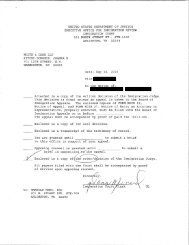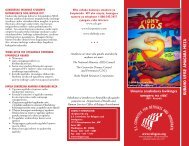Refugees and Asylum Seekers
Refugees and Asylum Seekers
Refugees and Asylum Seekers
Create successful ePaper yourself
Turn your PDF publications into a flip-book with our unique Google optimized e-Paper software.
($310) or six months in prison or both. The Government<br />
deployed managers to the two major camps but did not give<br />
notice in the Gazette.<br />
Pre-1990 refugees were eligible for international<br />
travel documents from the Government <strong>and</strong> UNHCR processed<br />
nearly 60 requests for refugees it recognized under<br />
its m<strong>and</strong>ate but authorities generally did not consider applications<br />
from Somalis.<br />
Jobs<br />
Right to Earn a Livelihood<br />
<strong>Refugees</strong> recognized<br />
by UNHCR were not eligible for<br />
work permits <strong>and</strong> it was unlawful<br />
for them to engage in economic<br />
activity. Police <strong>and</strong> local council<br />
law enforcement occasionally<br />
harassed <strong>and</strong> extorted bribes from those who attempted<br />
petty trade.<br />
Kenya maintained reservations on the 1951<br />
Convention’s right to work but only to allow protectionist<br />
restrictions on refugee employment for four years<br />
instead of the three the Convention allowed <strong>and</strong> to reject<br />
its requirement to give sympathetic consideration to assimilating<br />
refugee rights to those of nationals. It was still<br />
obliged to accord refugees “the most favorable” treatment<br />
accorded to nationals of foreign countries. Under the<br />
Immigration Act, the Government allowed class M work<br />
permits to refugees it recognized prior to 1990 but it did<br />
not issue new work permits nor did it renew expired ones<br />
in 2007. The <strong>Refugees</strong> Act subjected refugees to the same<br />
wage-earning employment restrictions as other foreigners<br />
<strong>and</strong> called upon the Commissioner to ensure that refugee<br />
economic activities did not have a negative impact upon<br />
host communities.<br />
Kenya’s reservation to the 1951 Convention’s extension<br />
of social security <strong>and</strong> compensation for death from<br />
job-related injuries <strong>and</strong> diseases was only that it apply them<br />
“as far as the law allows.” The reservation, however, did not<br />
cover the Convention’s requirement that Kenya extend equal<br />
treatment to refugees under its labor legislation. Nevertheless,<br />
most refugees did not enjoy such protection. They<br />
also lacked documentation to acquire l<strong>and</strong>, bank accounts,<br />
vehicles, <strong>and</strong> other assets.<br />
2+5=7<br />
D<br />
Public Relief <strong>and</strong> Education<br />
While the first of thous<strong>and</strong>s<br />
of Somali asylum seekers who entered<br />
after the border closure could<br />
register with UNHCR for food <strong>and</strong><br />
medical services in the camps, authorities<br />
halted this by June.<br />
Malnutrition rates in children under 5 were more<br />
than 22 percent in Dadaab <strong>and</strong> nearly 16 percent in Kakuma.<br />
The anemia rate for children under 5 was 78 percent <strong>and</strong><br />
nearly 73 percent among women.<br />
Officials from UNHCR, Kenya, <strong>and</strong> Sudan restricted<br />
education for Sudanese refugees to encourage them to repatriate.<br />
Camp residents received free health services, but<br />
if refugees used public services outside the camps without<br />
a referral, the facilities would charge them as foreigners.<br />
The Government provided the same free primary education<br />
to both refugees <strong>and</strong> nationals but some schools charged<br />
refugees fees.<br />
Kenya did not include refugees in the Poverty<br />
Reduction Strategy Paper it prepared for international donors,<br />
but its UN Development Assistance Framework for<br />
2009-2013 included implementation of the <strong>Refugees</strong> Act<br />
<strong>and</strong> refugee governance in its first priority area, Improving<br />
Governance <strong>and</strong> the Realization of Human Rights. The<br />
<strong>Refugees</strong> Act also called upon the Commissioner for Refugee<br />
Affairs to initiate projects promoting harmony between<br />
host communities <strong>and</strong> refugees <strong>and</strong> to advise the immigration<br />
minister on soliciting funds for refugee programs that<br />
helped host communities.<br />
Kuwait<br />
<strong>Refugees</strong> <strong>and</strong> <strong>Asylum</strong> <strong>Seekers</strong>: 51,000<br />
Iraq 45,000<br />
Former Palestine 6,000<br />
1951 Convention: No<br />
1967 Protocol: No<br />
UNHCR Executive Committee: No<br />
Population: 2,800,000<br />
GDP: $111.3 billion<br />
GDP per capita: $39,800<br />
Kuwait . Statistics .<br />
Introduction Although Kuwait continued to reject<br />
categorically Iraqi asylum seekers, it hosted around 45,000<br />
Iraqis most of whom entered on 3-month visit visas <strong>and</strong><br />
then overstayed. An estimated 6,000 Palestinians lived<br />
in Kuwait, many of them having arrived between 1948<br />
<strong>and</strong> 1967, although the Government considered them<br />
expatriates. Kuwait hosted an undetermined number of<br />
Ahwazi Arabs from Iran.<br />
Refoulement/ Physical Protection There<br />
were no reports of refoulement in 2007. Kuwait did not<br />
deport persons who claimed to fear persecution in their<br />
home countries. There were no reports of wrongful death<br />
109


